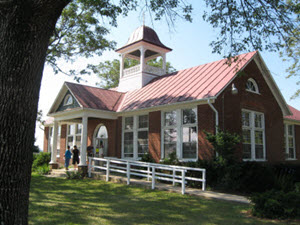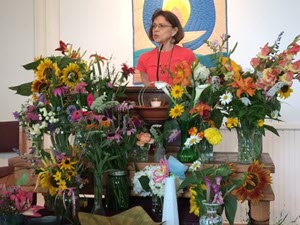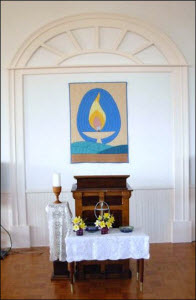
Young, Small, Lay-Led, and Covenant Groups Too?
Small Group Ministry at Harrisonburg Unitarian Universalists
By Sarah Cheverton, David Lane, and Merle Wenger
Covenant Groups: What are they and how do I join? ![]()
Here in Harrisonburg, Virginia, our small, lay-led congregation (founded just 20 years ago) might not seem a likely place to find covenant groups taking root. No minister to take the initiative, spread the word, train the facilitators, develop the session plans, recruit the participants. And with the heavy demands that shared ministry places on everyone in small congregations, how many folks (realistically) might be interested in taking part?
As it turns out, the answer to that question is almost 25% of our congregation’s current membership of nearly 90 – a percentage we would never have predicted when we inaugurated our facilitator training group at the beginning of 2011 or when we launched our three initial covenant groups last September.
Our Journey To Covenant Groups
With Bob Hill’s Complete Guide to Small Group Ministry as our roadmap, we found the impact of our check-ins and topic discussions increasingly more powerful. And we began to realize the huge importance of the structure itself as a framework for enabling participation. When we agreed not to interrupt, we listened differently because we had to. When we agreed to speak from our own experience, we found ourselves no longer privileged unequally by what we’d read and by how we’d been educated. Equal worth and dignity suddenly meant something radically new and different when the possibility of argument and debate was removed from the process of interaction. We began to see that contention could undermine real connection by shutting down anyone not highly verbal or not comfortable with the cut and thrust of intellectual discussion.
These were the key insights we shared with our board. And we did so by actually conducting an abbreviated covenant group session for the board to observe – our handouts and overviews just made more sense when accompanied by a demonstration. And then, with board support for the for the kind of groups we hoped to form, our next step was to enlarge our task force into a facilitator training group.
By this time, Les and Joni Grady from the Clemson congregation in SC had relocated to Harrisonburg and joined HUU. They brought with them extensive experience in small group ministry and were willing to host and facilitate a pilot training group. In addition to the Gradys, we recruited five others for the enlarged group. These were folks who had previously told us of their interest in spiritual practices/small group options at HUU. This expanded task force, ten in all, met for the next eight months, and at the end of that time six of its members committed to serve as co-facilitators for our three initial covenant groups.
Once we had facilitators, we developed a brochure, advertised via Sunday morning announcements, e-news reminders, and word of mouth, and within four weeks had enough interested folks for three functioning groups in addition to the facilitator training group. This group would continue to meet to provide facilitators with continuing opportunities for their own personal growth as well as for mutual supervision and accountability. We also decided that each group should meet on a different day and time during the month so that as many as possible of our members and friends could take part. To keep the work of facilitators manageable, not only did we decide to have two facilitators for each group, but our cofacilitators often agreed to alternate responsibility among themselves for leading the check-ins and the topic discussions from month to month. For the same reason, we encouraged our co-facilitators to rely on the SGM Network for topic ideas and session plans. But we also developed some original materials ourselves and have begun to share especially successful session plans among our four groups.
Expected and Unexpected Results
We learned a great deal in three years, both about ourselves as UUs and about covenant groups. Here are some of our most important discoveries and results so far:
The Development Process
- Haste makes waste – we took our time and we needed to. Without leadership from above, careful, deliberate steps, one at a time, are essential.
- The task force learned best by actually modeling for itself and others how a covenant group works.
- Structure makes for equality: rather than limiting participation, structure gives everyone equal opportunities to participate.
- A core training group can develop new facilitators and at the same time assure personal growth and mutual supervision for facilitators.
- Having co-facilitators share group leadership accords well with a commitment to shared ministry and makes facilitator recruitment much easier
- Using SGM Network resources makes session planning productive and manageable.
Impacts for Group Members and the Congregation
- It takes as many as five or six meetings before participants feel safe, comfortable, or strongly committed to their groups.
- The topics we discuss matter far less than the process we use when discussing them. Uninterrupted speaking, dedicated listening, and personal experience enrich and transform any conversation.
- Over time covenant group members do seem to connect more deeply with each other both during and outside of group meeting
- Covenant groups provide opportunities to build/ rebuild theologies based on “heart-talk” rather than just “head-talk.”
- Covenant groups show us that we actually have more leaders in our midst than we thought we had!
- Covenant groups model productive ways to listen and to speak that can serve as templates for healthy interaction in other congregational venues.
What Next?
When we began, we had no idea if others would see in covenant groups the kind of valuable and transforming experience that we gradually came to understand that it was. Though our expectations have certainly been exceeded by what has been accomplished, we know that continuing into the future will mean new challenges. Our hope is that over time, the impact of covenant groups can leaven the loaf of our congregational life, can become for us all a spiritual practice that reduces contention and enhances mutual support. We now know it is a powerful tool that can gradually change how we listen and speak and connect with each other. Over time we look to share that understanding as much as we can with everyone interested in its potential both for themselves as individuals and for our religious community as a whole.
Reprinted with permission from SGM Quarterly ![]()
For the latest sermons and events at HUU, visit our Community Cafe.
Inclement
Weather Policy
Worship
Service Materials


UUs on YouTube
Our denomination has an official presence on YouTube! The Unitarian Universalist Association's YouTube site includes several videos and lots of interesting commentary.
Harrisonburg Unitarian Universalists 4101 Rawley Pike | Harrisonburg,
VA 22801
Mailing Address: | PO Box 96 | Harrisonburg, VA 22803
| (540) 867-0073 | Webmaster
HUU is a member of the Southern
Region of the Unitarian Universalist
Association
Privacy Policy &
Disclaimer
Site Design & Maintainence : Expression
Web Tutorials & Templates


